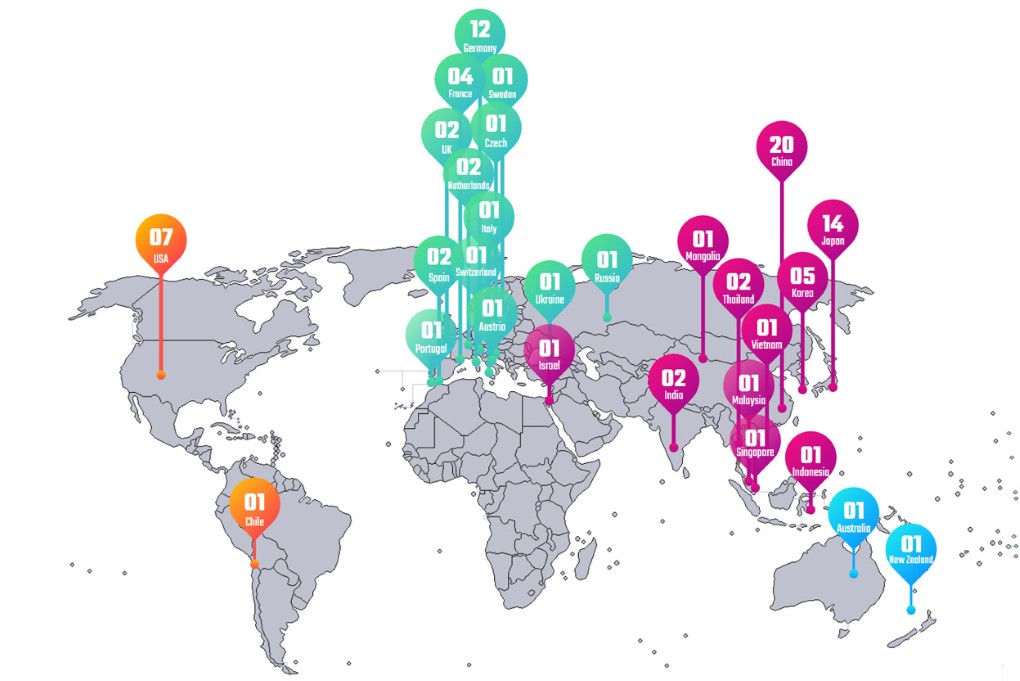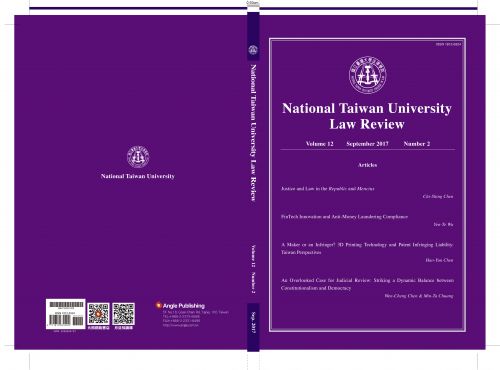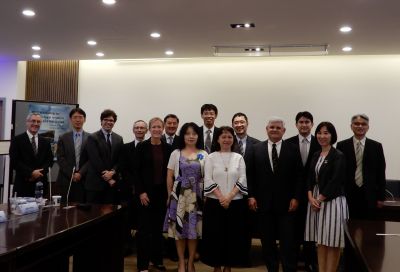eng (601)
Children categories
Summer Program (7)
College of Law Summer Program provides three weeks of intensive and substantial courses about international trade law and practice. Our top-notch instructors along with the high academic quality of our courses even allow you to obtain school credits. It is an excellent opportunity for students to familiarize themselves with theoretical and practical knowledge about international trade law and lawyering.
Additional Info
- Home Institute University of Trier
- Visiting Term Spring 2018
- Profile https://ppt.cc/fsNZBx
-
Course
Introduction to European Criminal Law
(歐洲刑事法導論)
National Taiwan University Law Review March 2017 Volume 12, Number 2
Justice and Law in the Republic and Mencius
- Author: Chi-Shing Chen
In this article, Chi-Shing Chen presents a sketch and a comparison of two perspectives of justice. Chi-Shing Chen discuss Plato’s idea of justice in the Republic, and Mencius’ thinking on the same topic in Mencius. Chi-Shing Chen conclude the paper by summarizing key differences and how the two thoughts may be complementary to each other.
FinTech Innovation and Anti-Money Laundering Compliance
- Author: Yen-Te Wu
In this article, Yen-Te Wu analyzed the compliance of FinTech firms with anti-money laundering (AML) laws in the US. The rapid emergence and growth of the financial innovations industry--or FinTech as it is commonly referred to in the financial services sector--has caught many players in the global financial services industry unaware. This article analyzed the compliance of FinTech firms with anti-money laundering (AML) laws in the US. The results of the study suggest that two main laws govern issues related to the laundering of monetary instruments.
A Maker or an Infringer? 3D Printing Technology and Patent Infringing Liability: Taiwan Perspectives
- Author: Hao-Yun Chen
In this article, Hao-Yun Chen focuses on patent infringement issues associated with 3D printing, and conducts an analysis on the potential conflict between protection of patent rights and non-commercial private use in the context of 3D printing technology. Part I explains the background of the issues. Part II explains the manufacturing process of 3D printing. Part III examines potential patent infringement liabilities in each step of the 3D printing process explained in the Part II, especially those related to digital manufacturing. Part IV discribes the rising of end-user infringement, and explores its impacts on patent law.
An Overlooked Case for Judicial Review: Striking a Dynamic Balance between Constitutionalism and Democracy
- Author: Wen-Cheng Chen & Min-Ta Chuang
In this article, Wen-Cheng Chen & Min-Ta Chuang analyzed Commentators disagree on the legitimacy of judicial review in a constitutional democracy. Many scholars who argue for (or against) judicial review have based their claims on democracy or democratic theory, while other scholars have founded their positive (or negative) arguments on constitutionalism or constitutional theory.
10/20/2017 Workshop on Current Legal Issues in Taiwan and the United States
University of California Berkeley School of Law and National Taiwan University School of Law jointly held “2017 Workshop on Current Legal Issues in Taiwan and United States” at Tsai Lecture Hall conference room 1 in 10/20/2017.
Prof. Laurent Mayali、Prof. John Yoo、Prof. Eric Rakowski、Prof. Amanda Tyler、Prof. Andrew Bradt and Post-Doctoral Fellow/Lecturer Dr. George Horvath from UC Berkeley School of Law were invited. Participants from Taiwan are Honorable Justice of Constitutional Court Sheng-Lin Jan, NTU law Dean and Professor Wang-Ruu Tseng, NTU law Vice Dean and Professor Kuan-Ling Shen, NTU law Vice Dean and Professor Ching-Ping Shao, NTU law Associate Professor Yu-Wei Hsieh, NTU law Assistant Professor Yueh-Ping Yang, Justice of Taiwan Intellectual Property Court Dr. Sungmei Hsiung, National Central University Institute of Law and Government Director and Professor In-Chin Chen and NCU Institute of Law and Government Professor Kai-Ping Su.
The sessions are “Regulation and Governance in a Commercial World”, “Judicial Reform and Criminal Court” and “Separation of Powers and Justice”. UC Berkeley Law and NTU law have further academic cooperation and exchange via this workshop.
Additional Info
- Home Institute Columbia Law School
- Visiting Term Fall 2017
- Profile http://www.law.columbia.edu/graduation/2012/student-profiles/shawn-watts
-
Course
Mediation Clinic
(調解實務演習)
Additional Info
- Home Institute Queen's University of Law
- Visiting Term Spring, Fall 2015
- Profile https://law.queensu.ca/directory/joshua-karton
-
Course
Spring Semester
Seminar on Comparative Civil Law (Ⅰ)
(比較民法專題研究一)International Commercial Arbitration
(國際商業仲裁)Fall Semester
Seminar on Comparative Contract Law (Ⅰ)
(比較契約法專題研究一)International Commercial Arbitration
(國際商業仲裁)
Additional Info
- Visiting Term Spring, Fall 2015
-
Course
Spring Semester
Seminar on American Constitutional Law
(美國憲法專題)Media Law, New Technology, and Constitutional Rights
(媒體法、新技術與憲法權利)International Disability Rights Law
(國際身心障礙者權利法)Fall Semester
Seminar on American Constitutional Law
(美國憲法專題)Media Law, New Technology, and Constitutional Rights
(媒體法、新技術與憲法權利)International Disability Rights Law
(國際身心障礙者權利法)
More...
Additional Info
- Home Institute University of Warwick
- Visiting Term Fall 2017
- Profile http://www2.warwick.ac.uk/fac/soc/law/people/ming-sung_kuo/
-
Course
Globalization and the Rule of Law: Comparative Analysis
(全球化與法治議題的比較分析)
Additional Info
- Home Institute Melbourne Law School
- Visiting Term Fall 2017
- Profile https://law.unimelb.edu.au/about/staff/jianlin-chen
-
Course
Economic Analysis of Law
(法律經濟分析)
Additional Info
- Home Institute University of Sydney Technology
- Visiting Term Fall 2017
- Profile https://www.uts.edu.au/staff/colin.hawes
-
Course
International Corporate Law: Theories and Case Studies
(國際公司法:理論與案例分析)
Additional Info
- Home Institute Universidad de Valencia
- Visiting Term Fall 2017
- Profile https://goo.gl/jfsbU8
-
Course
Harmonization of Private Law and Private International Law in the EU
(歐盟中私法與國際私法間之調和)
















